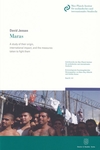Details

Jensen, David
Maras
A study of their origin, international impact, and the measures taken to fight them.
Duncker & Humblot
978-3-428-14310-8
1. Aufl. 2014 / 245 S.
Monographie/Dissertation
Kurzbeschreibung
Reihe: Schriftenreihe des Max-Planck-Instituts für ausländisches und internationales Strafrecht. Reihe K: Kriminologische Forschungsberichte. Band: 163
The maras, once regarded as a regular street gang in Los Angeles, have increasingly gained the attention of the media and national authorities due to their rapid expansion across the United States, Mexico, and Central America. Eventually, Central American governments began considering the maras, at least in their political discourses, as a threat to national security and thus started implementing measures to specifically combat them. In Honduras, the government reformed the Penal Code and conducted raids. The Salvadoran authorities, on the other hand, passed a law against the maras that ultimately remained in effect for only a couple of months. In Guatemala, the authorities failed to pass a specific law on the maras, but they still carried out massive raids.
This book provides an explanation to the origin of the maras and their territorial expansion. It analyzes the measures adopted against them in Honduras, Guatemala, and El Salvador, and compares the results obtained in each country. The particular set of events allows the author to study what happens when three countries with similar cultural backgrounds face the same problem in three different ways: How did the authorities enforce the measures in each country? Did the measures have an impact on national crime rates? How did the maras react to the measures? The answers to these questions will provide guidance to policy makers and a reference to researchers.
